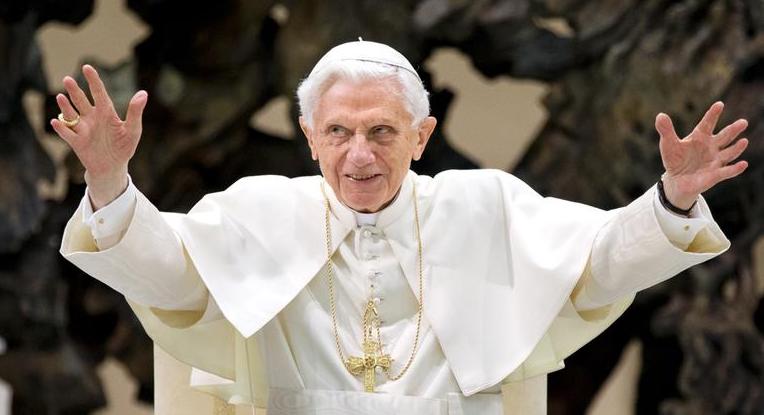When he retired as Pope in 2013, Benedict XVI said that he would be “hidden from the world”. But this week he was in the headlines, not for the first time, after extracts from a new interview were published. Benedict told his biographer Peter Seewald that “seemingly humanistic ideologies”, including those which justify abortion, same-sex marriage and IVF, are a potent threat to the Church. He also addressed the allegation, often made by his critics, that by saying this sort of thing he was breaking a pledge to remain silent. “The claim that I regularly interfere in public debates,” Benedict said, “is a malicious distortion of the truth.”
You can see the critics’ point. There is only one Pope, and it is no longer Benedict. So why is he calling himself “Pope Emeritus”, dressing in white and giving high-profile interviews? Wouldn’t it be less confusing if he was an invisible figure, quietly writing his memoirs for posthumous publication, only glimpsed in the occasional press photo tickling his cats under the chin or sitting back in the sun with a foaming stein of weissbier?
Then again, it’s hard to hope for this brilliant thinker to fall silent. Many Catholics attribute their conversions, at least in part, to his meditative and sharp-witted writings; many non-Catholics have found in his work a cogent critique of modernity. Moreover, Benedict never actually “promised” to keep shtum, he just spoke poetically about being secluded. And when he has spoken, he has tried to stick to theological and historical topics rather than current controversies within the Church.
The trouble is that in recent years it has become very, very difficult to avoid those controversies. Catholicism is rightly known for its stability and continuity, but there are occasional eras when a spectacular food-fight breaks out in the canteen, and we’re currently in that sort of era. Cardinals denounce each other, open letters are signed, and the word “heresy” has made an impressive comeback. No doctrine has changed. But Pope Francis has made countless ambiguous statements, while promoting outspoken critics of Church teaching — all of which contributes to the tension.
In such an atmosphere, it’s hard for Benedict to say anything which can’t be seized on. Remarks which would otherwise be innocuous — saying how fond he is of the Pope, or reflecting on the value of priestly celibacy — will sound like dramatic interventions. There is no square foot of turf without a mine underneath it.
Things would indeed be simpler if Benedict had gone the full JD Salinger and disappeared completely. But it is a consolation, at this extraordinary moment, to hear from one of the few people on the world stage whose voice carries the authentic, unmistakable note of wisdom.











Join the discussion
Join like minded readers that support our journalism by becoming a paid subscriber
To join the discussion in the comments, become a paid subscriber.
Join like minded readers that support our journalism, read unlimited articles and enjoy other subscriber-only benefits.
Subscribe